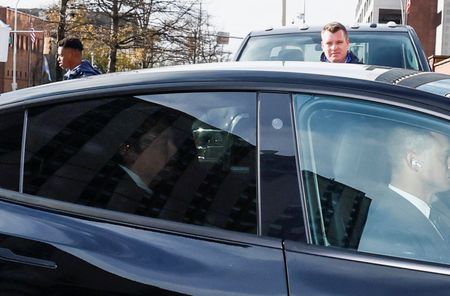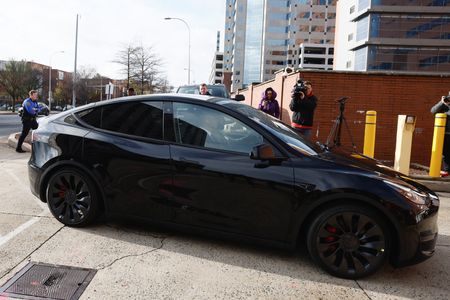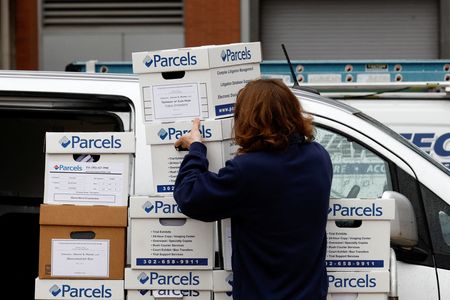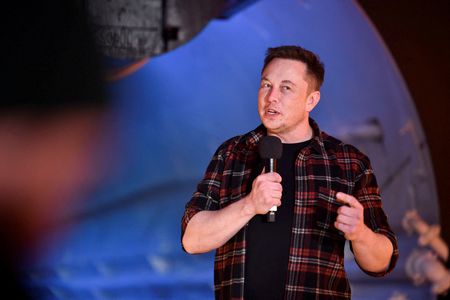By Tom Hals and Hyunjoo Jin
WILMINGTON, Del (Reuters) -Elon Musk said in court on Wednesday that he made some Tesla Inc decisions without the approval of the company’s directors, as he defended his $56 billion pay package against claims that he dictated its terms to a compliant board.
Tesla shareholder Richard Tornetta sued Musk and the board in 2018 and hopes to prove that Musk used his dominance over Tesla’s board to obtain an outsized compensation package that did not require him to work at the electric car maker full-time.
Questioned by Tornetta’s lawyer, Greg Varallo, Musk rejected claims that his pay package goals were easy to achieve.
“The amount of pain, no words can express,” Musk said in a near-whisper, describing the effort required to get the company from brink of failure in 2017 to explosive growth. “It’s pain I would not wish to inflict upon anyone.”
Varallo repeatedly sought to portray Tesla as a company under the grip of Musk, the world’s richest person, and tried to show that Musk bypassed Tesla’s board on several occasions.
For example, Musk said he made a unilateral call on ending Tesla’s acceptance of Bitcoin cryptocurrency and acknowledged that the board was not informed before he told analysts in October that Tesla’s board was considering buying back up to $10 billion of stock.
But the testimony did not definitely prove who developed Musk’s 2018 pay package or establish whether it was a product of his demands rather than negotiations with the board.
The five-day trial comes as Musk is struggling to oversee a chaotic overhaul of Twitter Inc, which he was forced to buy for $44 billion in a separate legal battle before the same judge, Chancellor Kathaleen McCormick, after trying to back out of that deal.
Musk tweeted this week that he was remaining at Twitter’s San Francisco headquarters around the clock until he fixed that company’s problems, and said on Wednesday he had come to Delaware on an overnight flight from the social media company.
Musk said his focus on restructuring Twitter would soon wind down and he would find someone else to lead it. He was dismissive of the argument that his pay deal should have obligated him to spend a set number of hours at Tesla.
“I pretty much work all the time,” he said. “I don’t know what a punch clock would achieve.”
While Musk has a history of combative testimony, calling lawyers “reprehensible” or “a bad human being,” he was relatively restrained in Wednesday’s proceedings, though at times expressed frustration with Tornetta’s attorney.
At one point, Musk told the plaintiff lawyer, “your question is a complex question that is commonly used to mislead people.”
Musk acknowledged that he was not a lawyer but added, “when you’re in enough lawsuits you pick up a few things.”
A ‘PRODUCT GENIUS’
Tornetta has asked the court to rescind the 2018 package, which his attorney said was $20 billion larger than the annual gross domestic product of the state of Delaware.
The legal team for Musk and the Tesla directors have cast the pay package as a set of audacious goals that worked by driving 10-fold growth in Tesla’s stock value, to more than $600 billion from around $50 billion.
They have argued the plan was developed by independent board members, advised by outside professionals and with input from large shareholders.
Tornetta’s attorney tried to show Musk was involved from the start. An email from May 2017 appeared to establish that Musk was pushing for the pay plan months before the board negotiated it with him.
“I’m planning something really crazy, but also high risk,” he wrote.
Antonio Gracias, a venture capital investor and longtime friend of Musk who was also a Tesla board member from 2007 to 2021, took the stand after Musk testified.
Gracias said he was prepared to push back on Musk if necessary. “I don’t pull punches with any of my CEOs,” he told the court.
The disputed Tesla package allows Musk to buy 1% of Tesla’s stock at a deep discount each time escalating performance and financial targets are met. Otherwise, Musk gets nothing.
Tesla has hit 11 of the 12 targets, according to court papers.
Shareholders generally cannot challenge executive compensation because courts typically defer to the judgment of directors. The Musk case survived a motion to dismiss because it was determined he might be considered a controlling shareholder, which means stricter rules apply.
Gracias described Musk as essential to the company’s success in his testimony, calling him “extraordinary” and a “product genius.”
(Reporting by Tom Hals in Wilmington in Delaware and Hyunjoo Jin in San Francisco; Additional reporting by Jody Godoy; Writing by Denny Thomas;Editing by Noeleen Walder, Jonathan Oatis and Bill Berkrot)




